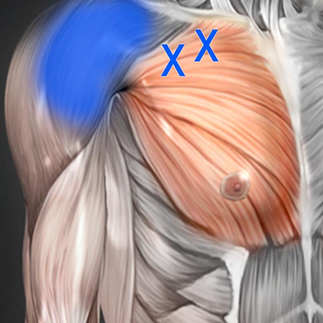How Elite Recovery Helps Athletes Heal from Frozen Shoulder Pain
- Tiffany Sandoval
- Jul 26, 2024
- 4 min read
Updated: Nov 6, 2024

Frozen shoulder, also known as adhesive capsulitis, is a condition characterized by stiffness and pain in the shoulder joint. It's a common issue among athletes due to the repetitive and strenuous movements their sports often demand. At Elite Recovery Sports Therapy, we specialize in neuromuscular sports massage, which is particularly effective in treating frozen shoulder. Let’s delve into how our targeted therapies can help athletes heal by understanding the muscles, fascial lines, and lymphatic systems involved
Understanding Frozen Shoulder
Area of the Body Pain is Felt: The shoulder joint and surrounding areas.
Type of Pain Felt: Sharp, dull, electric, burning, tingling, numb, hot, or cold sensations.
Stages: Painful stage (increasing pain and stiffness), frozen stage (stiffness, reduced pain), thawing stage (gradual improvement in range of motion).
Freezing Stage: This initial stage involves pain and a gradual loss of motion.
Frozen Stage: The shoulder becomes increasingly stiff, but pain may begin to diminish.
Thawing Stage: Motion begins to improve, and pain continues to lessen.
Range of Motion Issues: Difficulty lifting the arm, reaching behind the back, or performing overhead activities.Each stage has distinct symptoms and requires specific treatment approaches.
Muscles Involved
Several key muscles contribute to shoulder range of motion and are often impacted by frozen shoulder. Below are the muscles, their trigger points, referral patterns, and associated muscle actions:
Deltoid:
Trigger Points: Upper shoulder.
Referral Patterns: Outer shoulder and upper arm.
Range of Motion Action: Abduction.
Synergist Muscles: Supraspinatus.
Agonist Muscles: Pectoralis major (clavicular part).
Rotator Cuff Muscles:
Supraspinatus:
Trigger Points: Top of the shoulder.
Referral Patterns: Deep ache in the shoulder.
Range of Motion Action: Abduction.
Synergist Muscles: Deltoid.
Agonist Muscles: Latissimus dorsi.
Infraspinatus:
Trigger Points: Below the scapula.
Referral Patterns: Front of the shoulder and down the arm.
Range of Motion Action: External rotation.
Synergist Muscles: Teres minor.
Agonist Muscles: Subscapularis.
Teres Minor:
Trigger Points: Back of the shoulder.
Referral Patterns: Posterior shoulder.
Range of Motion Action: External rotation.
Synergist Muscles: Infraspinatus.
Agonist Muscles: Subscapularis.
Subscapularis:
Trigger Points: Front of the shoulder blade.
Referral Patterns: Back of the shoulder and down the arm.
Range of Motion Action: Internal rotation.
Synergist Muscles: Pectoralis major.
Agonist Muscles: Infraspinatus, Teres minor.
Trapezius:
Trigger Points: Upper back and neck.
Referral Patterns: Neck, shoulder, and upper back.
Range of Motion Action: Elevation of the scapula.
Synergist Muscles: Levator scapulae.
Agonist Muscles: Lower trapezius (depression).
Pectoralis Major and Minor:
Trigger Points: Chest.
Referral Patterns: Chest, shoulder, and down the arm.
Range of Motion Action: Flexion, adduction, and internal rotation.
Synergist Muscles: Anterior deltoid.
Agonist Muscles: Latissimus dorsi (extension and adduction).
Fascial Lines
Fascial lines are networks of connective tissue that run throughout the body, influencing muscle function and movement. Key fascial lines involved in frozen shoulder and their impact on pain include:
Superficial Front Line: Affects shoulder and chest movement.
Superficial Back Line: Influences the upper back and shoulder.
Functional Lines (Front and Back): Affect dynamic movements and stabilization of the shoulder joint.
Lymphatic System
The lymphatic system plays a crucial role in managing pain and range of motion. Key lymph nodes involved include:
Axillary Lymph Nodes: Located in the armpits, these drain the shoulder area and are essential for reducing inflammation and promoting healing.
How Elite Recovery Sports Therapy Can Help
At Elite Recovery, we use a combination of techniques to address frozen shoulder pain:
Neuromuscular Therapy: Targets trigger points to reduce pain.
Myofascial Release: Loosens tight fascia to improve movement.
Lymphatic Drainage: Reduces inflammation and promotes healing.
Cupping: Enhances blood flow and reduces muscle tension.
Fascial Stretch Therapy: Increases flexibility and range of motion.
What to Expect During Treatment
During your session at Elite Recovery, you can expect a thorough assessment of your shoulder's condition. Tiffany will develop a personalized treatment plan that may include:
Targeted Massage: Focusing on the specific muscles and fascia involved in your frozen shoulder.
Stretching Exercises: Designed to improve flexibility and range of motion.
Lymphatic Drainage Techniques: To reduce swelling and promote healing.
Cupping Therapy: To increase blood flow and alleviate muscle tension.
By addressing the underlying causes of frozen shoulder, we can help athletes regain their shoulder function and return to their sports more quickly and effectively.
Self Release Videos
Conclusion
Frozen shoulder can be a debilitating condition for athletes, but with the right approach, recovery is possible. At Elite Recovery Sports Therapy, we understand the complexities of this condition and offer specialized treatments to help you heal. Our expertise in neuromuscular massage, fascial release, and lymphatic drainage makes us uniquely equipped to support athletes in their recovery journey. If you're struggling with frozen shoulder, contact us today to schedule an appointment and take the first step toward regaining your mobility and strength.
Click below for more areas of pain Elite Recovery Murrieta / Temecula Sports Massage can help you with :
Book Your Session
Remember, early intervention and specialized care can make a significant difference in your recovery. Let Elite Recovery help you get back to the top of your game!
Elite Recovery Murrieta Sports Therapy
Phone:(949) 444-2154
Email:Info@TiffanySandoval.com
Website: www.TiffanySandoval.com






























Comments